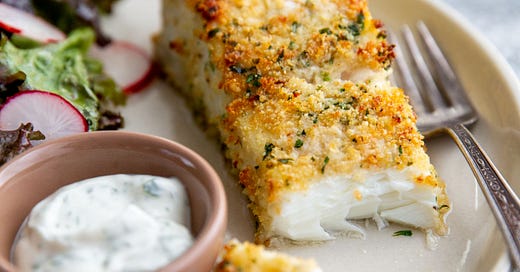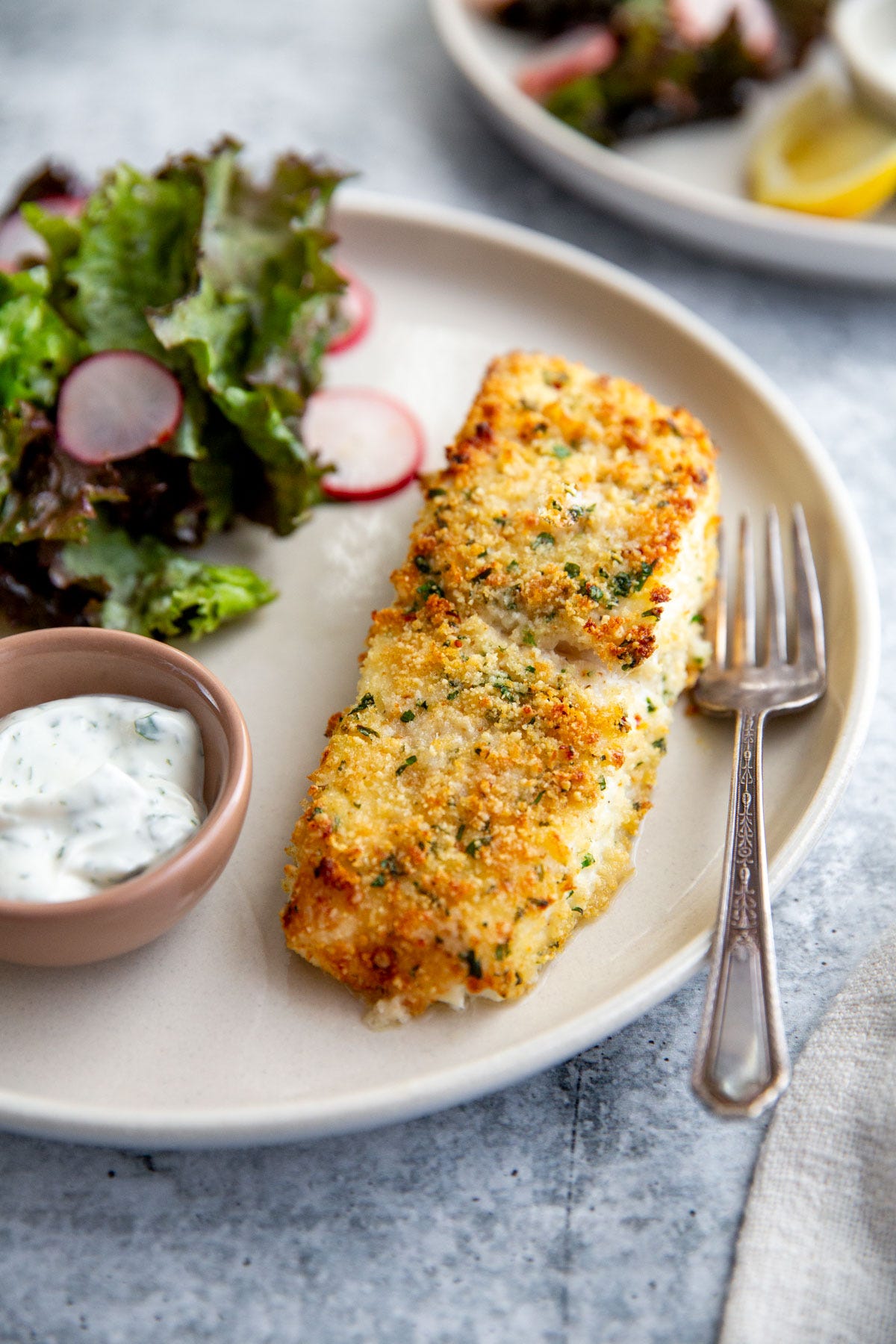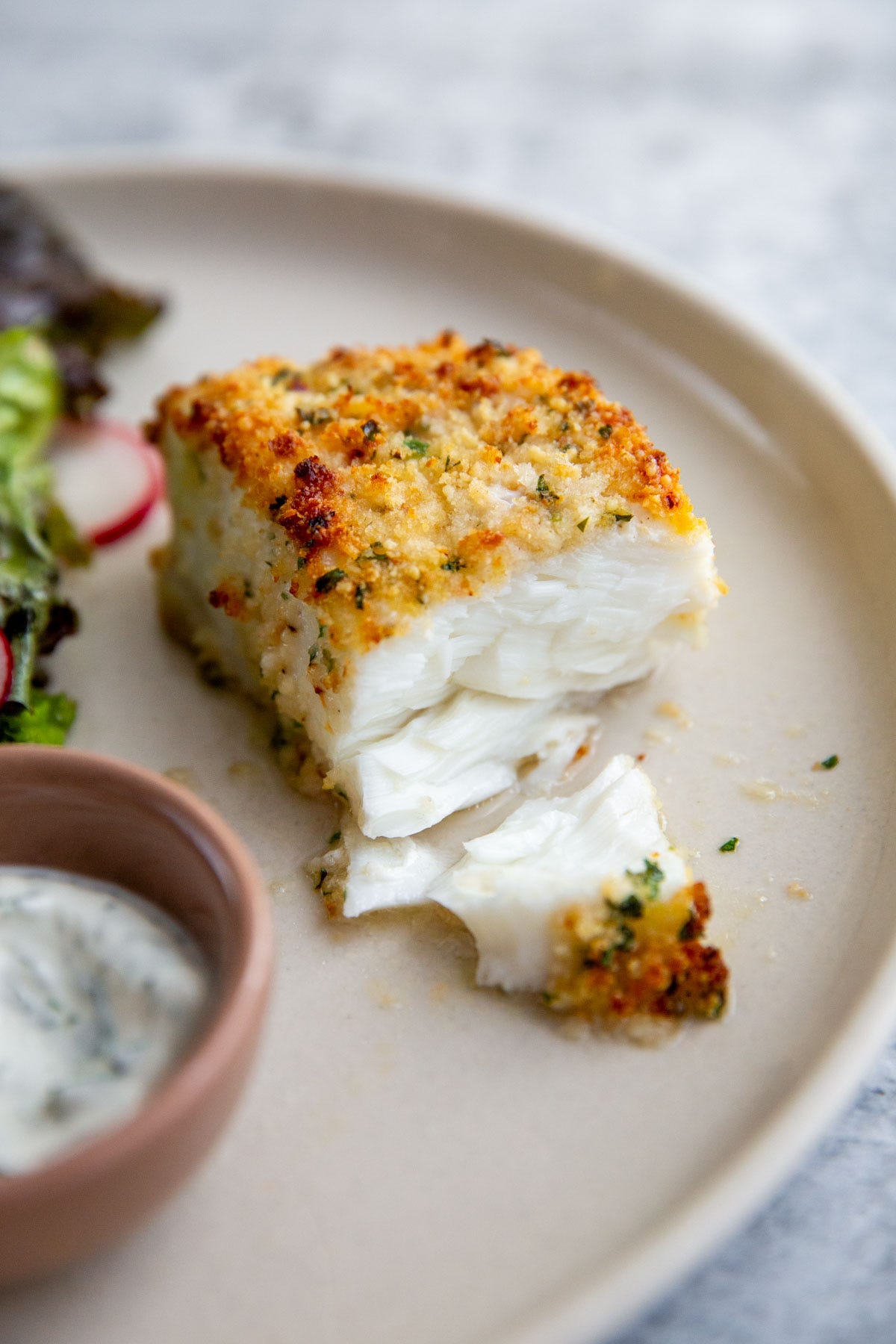Happy Friday, friends! Today I’m continuing the parmesan-crusted theme from last week (see these crazy delicious delicata squash rings) with Parmesan Crusted Halibut Fillets. They’re sophisticated but easy, elegant but accessible (and my kids love them!). In other words, this is a fish dish for the masses. It would be a mighty fine main course for a holiday meal, but it’s also easy enough for weeknights. Before we jump into the recipe, however, I want to share a curious thing that happened when I tried to write the essay this week.
Up until Sunday, I had absolutely no clue what I was going to say today. As I’ve mentioned before, when I started this newsletter last year, I made a commitment to not plan the essays (although I do plan the recipes and podcast episodes out of necessity). Instead, I decided to lean into trust, allowing the topics to show up for me instead of mental-ing my way there. This is directly opposite of how I worked for most of my life—I’m a planner by nature and loving having a tidy calendar, color coded weeks in advance. But for these essays, I knew I wanted to speak from my heart, not from the projections of my mind. What you read here is a reflection of my own personal evolution, in real time.
Usually the essay ideas drop in (or bubble up) a week or two before I publish them. I scribble out the first draft in my journal then type it up and edit it the week before it’s posted. But as of Sunday, I still had no idea what I was going to write about. As I sat in meditation early that morning (this is something I’ve been doing for twenty years, because it keeps me sane), I asked, “What do I need to know today?” I heard: “Rest. Let your body guide you today.” I also distinctly heard, “Don’t work.”
The line between my work life and my life life is a blurry one. My work (this newsletter, my podcast, my upcoming book, and all the logistics that go into running a small business) fuels me, both literally and figuratively. This is truly my passion. Since my work involves cooking, I’m also often testing recipes on the weekends and in the evenings (I had just tested two recipes for the book on Saturday). On Sunday I had planned to test another book recipe and to make these cookies with the kids. But as the morning moved on, I started to feel deeply tired. You know the feeling when you’re not sick but your body is fighting the start of something? That’s how I felt. My inner voice knew that I needed rest that day, before I had experienced any physical symptoms.
Rest does not come easy to me. As I’ve described, I’m a doer. For years I prided myself in my productivity. I viewed it as a measure of my success (this is something
and I spoke about in our podcast conversation). Moreover, for me, doing often feels easier than sitting. If I just keep going (and going, and going…) then I don’t need to pause and go inward. I don’t need to feel what’s in front of me.On Sunday, I truthfully didn’t want to admit that I was starting to feel tired. I wanted to do a yoga class and finalize that recipe that was hanging over my head! I wanted to decorate cookies and take a walk! But instead, I (somewhat begrudgingly) heeded the call of my body. I drew a hot epsom salt bath and sank in. And there it was—in a flash of understanding, I knew that REST was what I wanted to talk about this week. (Curiously, when I got out of the bath, I scratched a first draft of this newsletter, realizing that yes, I was working. But only in committing to not work—as I heard in my meditation—could this essay have come about. It was a profound reminder that I can trust this process, and that when I cede control of my mind to my heart, I open the door to flow.)
Rest (isn’t always easy)
I spent the rest of the day on Sunday tucked into the corner of the couch. The girls and I watched a movie, and I finished a novel (I loved it, btw). I surrendered to rest. We all have an inherent need for more rest right now, whether we’re fighting a sickness or not. As Emily Morrison explained in this podcast episode, we are microcosms of the external world, and when we follow the external cycles of nature, we find more internal balance. In December, as the days get darker and darker, we’re being asked to get quieter and quieter. We’re being invited to go into the dark place of regeneration, tending to our own inner light in the same way that we tend to the fires that warm our homes.
December can be a beautiful time to celebrate the warm darkness of rest, but in our society it’s one of the busiest months of the year. It’s impossible to escape the frenetic pull of the season and the chaos of consumerism, even if we choose to stay in and say no to all the parties. Many of us have increased obligations this month, from family gatherings, to kids’ performances, to school fundraisers, to work parties, and so on (and so on). It’s unrealistic to commit to a full month of rest (even if crawling into bed sounds awfully nice). However, I’ve found that we can commit to moments of quality quiet, and those moments can make all the difference.
Quality quiet (can happen anywhere)
Natalie Deeb once told me that, in the lens of Chinese medicine, we all have a set amount of “life chi” (I don’t remember the exact words she used so might be messing that up, but she was referring to our inherent life force). This is the chi we’re born with, and it’s a finite amount. When we’re drained and tired and push ourselves to keep going anyway, we start to burn out that life chi, and there’s no getting it back. This has stuck with me. If I’m exhausted and do all the things anyway, I’m literally burning my life force, depleting myself in a much more profound way than simple physical exhaustion.
Finding pockets of quality quiet can help keep us nourished and balanced, fueling us even when we aren’t able to take a long nap or curl up in bed for the day. Just a few minutes—or even seconds—of intentional rest can be the kindling to help fuel us through our activities. Instead of zoning out in front of the tv or scrolling through social media (which have their time and place), it’s a conscious tuning into quiet. If we bring intentions into the picture, I’ve found that the impact is greatly magnified.
If I only have five minutes to lay down but set an intention to relax and replenish, it’s easier to release the thoughts in my mind and sink deeper into my body. I’ll feel far more rejuvenated than if I just plop myself on the couch and zone out. If I’m stressed out and set an intention to calm my nervous system during a brief meditation, my body more easily complies. I’m able to breathe more deeply, easing the overwhelm. In the kitchen, If I set an intention to nourish myself with care when cooking or eating, the meal becomes a form of self care. Instead of simply shoveling in food to appease hunger, the food becomes a richer source of fuel, connecting me to my body and nourishing my emotions.
Bringing intention into moments of rest—and into the kitchen—feels a bit like a superpower. A ten minute catnap can feel like an hour of sleep, and a five minute meditation can feel like a total nervous system reset. When we’re intentional in the kitchen, a simple snack can feel like a nourishing hug (or a burst of sustainable energy, depending on what our bodies need). We not only refuel our bellies, but we also refuel something deeper.
Indeed, the girls and I were hit with an upper respiratory virus on Monday. Thankfully by Tuesday I was feeling almost better again. Almost. Writing this essay reminded me that in order to fully heal, I needed more rest. These words became my own teaching. Nurturing our bodies isn’t a luxury that we should give ourselves only in moments of “self care,” but rather something we can give ourselves every single day, even during our scheduled activities. I paused in my car, resting before picking up my kid. I poured myself cup after cup of tea, inviting the warm liquid to soothe and replenish my body. I cooked a pot of soup with intention, inviting the ingredients to sustain me. I sat and looked out the window before finishing these words, allowing the beauty of nature to uplift me.
Invitation
My invitation this week is to give yourself moments of quality rest. Whether it’s two seconds, two minutes or two hours, what does it feel like to set an intention for rich replenishment?
You can do this literally anywhere. You can take two minutes to breathe deeply in the car before going into work (or the mall, eek!). You can close your eyes for a few beats at your local coffee shop before taking your first sip of brew (I love to do this in a quiet corner, breathing in the smells and allowing the background hub to soothe me). You can meditate literally anywhere (I meditate in my closet—no joke!—because for many years it was the only place that I could escape my family). And of course you can settle in for a nap, setting an intention for rejuvenation, even if you only have a few minutes (this can also be done in a car or on a plane).
There are many ways to rest, and there is no “right” way. Go inward, and get intentional. Ask your body what it wants, and trust in its response.
Related Essays and Podcasts:
Living and Eating in a Sacred Way with Natalie Deeb (podcast)
Food & Our Bodies through the Lens of Chinese Medicine with Emily Morisson (podcast)
Parmesan Crusted Halibut
I don’t have a segue into this recipe, except to say that if you’re looking for a gorgeous main course that still offers ease, this one is for you. The fish is crispy on the outside, juicy and tender in the center, and it has a rich flavor from herbs and parmesan. I love to serve it with this Herbed Aioli or this Tarragon Aioli, which are like chic versions of tartar sauce.
Keep reading with a 7-day free trial
Subscribe to Mind, Body, Spirit, FOOD to keep reading this post and get 7 days of free access to the full post archives.







